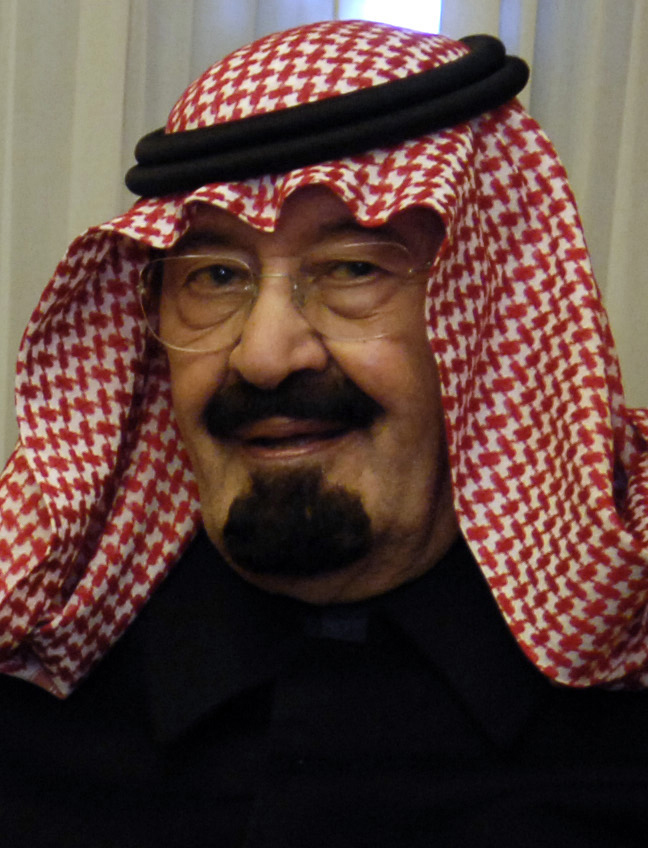by Susan Flantzer © Unofficial Royalty 2014

KIng Abdullah of Saudi Arabia; Credit – Wikipedia
Arabic Naming Conventions
- Al – family/clan of…
- bin or ibn – son of…
- bint – daughter of…
King Abdullah bin Abdulaziz Al Saud was born on August 1, 1924, in Riyadh, then in the Sultanate of Nejd, now in the Kingdom of Saudi Arabia. His father was the first King of Saudi Arabia, Abdulaziz, also known as Ibn Saud. His mother was Sheikha Fahda bint Asi Al Shuraim. King Abdullah had two younger full sisters: Nuf bint Abdulaziz and Seeta bint Abdulaziz (1930-2011) and many half-siblings.
King Abdulaziz had a polygamous household comprising several wives at a time and numerous concubines. It is thought he had a total of 22-24 wives. Abdulaziz was the father of almost a hundred children, including 45 sons of whom 36 survived to adulthood. The six Kings of Saudi Arabia who followed King Abdulaziz were all his sons.
- King Saud of Saudi Arabia (1902 – 1969, reigned 1953 – 1964, deposed)
- King Faisal of Saudi Arabia (1906 – 1975, reigned 1964 – 1975, assassinated)
- King Khalid of Saudi Arabia (1913 – 1982, reigned 1975 – 1982)
- King Fahd of Saudi Arabia (1921 – 2005, reigned 1982 – 2005)
- King Abdullah of Saudi Arabia (1924 – 2015, reigned 2005 – 2015)
- King Salman of Saudi Arabia (born 1935, reigned 2015 – present)
King Abdullah received a formal religious education at the royal court. From his father, he developed a deep respect for religion, history, and Arab heritage. He spent years living in the desert with Bedouin tribes and learned their values of honor, simplicity, generosity, and bravery. It is thought that his mother’s descent from the powerful Shammar tribe and a speech impediment led to a delay in having equal status with the other sons of King Abdulaziz.
In 1962, the then Prince Abdullah was chosen by King Faisal to command the Saudi National Guard. Upon the succession of King Khalid in 1975, he was appointed Second Deputy Prime Minister. When King Fahd came to the throne in 1982, he was named Crown Prince and First Deputy Prime Minister. As First Deputy Prime Minister, Crown Prince Abdullah presided over cabinet meetings and governed the country as deputy to King Fahd.
Abdullah bin Abdulaziz was proclaimed the sixth King of the Kingdom of Saudi Arabia on August 1, 2005, upon the death of King Fahd bin Abdulaziz. The Kings since King Abdulaziz’s death had all been his sons: Saud, Faisal, Khalid, Fahd, Abdullah, and Salman. Saudi Arabia does not have a clearly defined succession, but the sons of King Abdulaziz were considered to have a primary claim on the throne. In 2006, King Abdullah set up the Allegiance Council composed of the sons and grandsons of King Abdulaziz, to vote by a secret ballot to choose future kings and crown princes.
King Abdullah had more than 11 wives and had more than 36 children. For more information about his family see Wikipedia: King Abdullah of Saudi Arabia – Personal Life.
Throughout his life, King Abdullah had a love of the desert and a love of horsemanship. He was a breeder of pure Arabian horses and the founder of the equestrian club in Riyadh. Another lifelong passion was reading which he considered very important. He established two libraries, the King Abdulaziz Library in Riyadh, and one in Casablanca, Morocco.

Abdullah in a meeting with US Secretary of State John Kerry in 2014; Credit – Wikipedia
King Abdullah died on January 23, 2015, in Riyadh, Saudi Arabia at the age of 90, three weeks after being hospitalized for pneumonia. He was buried at the Al-Oud Cemetery in Riyadh. Although the sons of King Abdulaziz were aging and some members of the Saudi royal family thought it was time for the next generation to come to the throne, Abdullah was succeeded by his 79-year-old half-brother Salman bin Abdulaziz Al Saud.
This article is the intellectual property of Unofficial Royalty and is NOT TO BE COPIED, EDITED, OR POSTED IN ANY FORM ON ANOTHER WEBSITE under any circumstances. It is permissible to use a link that directs to Unofficial Royalty.

